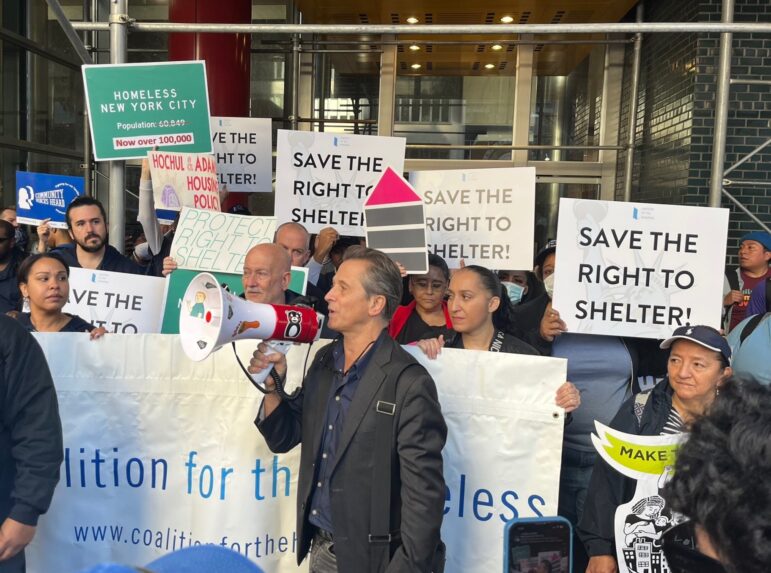“The parties have agreed that for now there should not be a war of legal papers,” New York State Supreme Court Judge Gerald Lebovits said Thursday. “That for now, the solution is to try to settle the matter if possible and to solve any problem that may exist.”
Courtesy of VOCAL-NY
Dave Giffen, executive director of the Coalition for the Homeless, with other housing advocates and activists at an Oct. 6 rally in support of New York’s right to shelter.
Mayor Eric Adams’ administration is not proceeding with a formal request to suspend the right to a shelter bed for single adults in New York City—at least for now.
In a Manhattan courtroom on Thursday, following 90 minutes of closed-door discussions, New York State Supreme Court Judge Gerald Lebovits said attorneys for the city, state and homeless advocates will instead continue meeting in private, with an eye toward a possible settlement.
“The parties have agreed that for now there should not be a war of legal papers,” Judge Lebovits said. “That for now, the solution is to try to settle the matter if possible and to solve any problem that may exist.”
The news was welcome to the Legal Aid Society, which has been locked in negotiations for months on behalf of Coalition for the Homeless. Talks started in the late spring, after Mayor Adams first sought relief from the 1981 consent decree in Callahan v. Carey, a lawsuit that established the right to shelter for single men.
“We are very grateful that the court and the parties agreed that we should continue to discuss how to solve the problem,” said Josh Goldfein of Legal Aid. “No one wants to see people on the streets of New York exposed to the elements.”
New York City is uniquely obligated to provide a shelter bed to anyone in need, at least temporarily—part of a set of rules that grew from the Callahan decree and subsequent court decisions.
But the Adams Administration has argued that an influx of recently-arrived immigrants since early 2022 has pushed New York City’s shelter system beyond capacity. There are now 118,000 people staying in city shelters—over 64,000 of whom are asylum seekers—compared to about 60,500 in January 2022, according to City Hall.
Advocates had condemned Adams’ latest proposal to suspend shelter rights as extreme, arguing that it would result in people being turned out to the streets ahead of the cold winter months.
In an Oct. 11 letter to the court, Legal Aid included graphic images of frostbite sustained by a person who slept outside in freezing temperatures in Massachusetts, that had been submitted previously in the decades-old case.
Gov. Kathy Hochul, meanwhile, endorsed the mayor’s proposal in a court filing, calling it a “measured and appropriate modification.”
The request is distinct from city policies limiting stays to one or two months for recently-arrived immigrants in certain shelters—including, as of recently, for families with children.
While advocates say the time limits are unfairly disruptive, Legal Aid so far has not challenged them in court, saying shelter rights aren’t violated so long as everyone has the option to land a new shelter bed once their time is up.
Neither City Hall, nor Hochul’s office, immediately replied to a request for comment on Thursday’s court developments. Before dismissing the parties, Judge Lebovits previewed private talks starting next week, in the “robing room” adjacent to his bench.
“The proper path forward is to discuss logistics and nuts and bolts confidentially in the robing room and that’s what the court and the parties will be doing a lot of beginning next week,” he said. “The public will not be able to attend.”
Thursday marked Judge Lebovits’ first appearance in Callahan. He stepped into the case after Judge Erika Edwards recused herself in September, citing concerns about perceived impartiality. A state supreme court judge since 2015, Lebovits first took the bench in New York City Housing Court, from 2001 to 2010.
Sateesh Nori, a clinical adjunct professor at NYU Law School, appeared before Judge Lebovits while working as a tenant lawyer at Legal Aid. He also co-authored a law journal article with the judge in 2009 called “Section 8: New York’s Legal Landscape.”
“He will take it very seriously and he’s very knowledgeable about the issues,” Nori said of Judge Lebovits’ new role in the Callahan case. “He’s a scholar of housing law and legal practice.”
Asked what a judge with Lebovits’ background might bring to a case about shelter rights, Goldfein of Legal Aid said housing court judges are used to negotiating resolutions between parties without getting into protracted litigation.
“Any judge comes to the courtroom with their own life experience,” he said. “Certainly housing court is a forum where most cases are resolved and we are grateful that Justice Lebovits wants to use those skills to try to see if this case can also be resolved.”
To reach the editor behind this story, contact jeanmarie@citylimits.org. To reach the reporter, contact emma@citylimits.org.


Leave a Reply